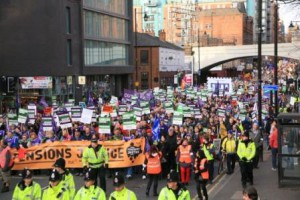Elected mayors: a sticking plaster on the north-south divide
Article published: Tuesday, May 1st 2012
Referendums on whether or not to have directly elected mayors will take place in 10 English cities this week. Underlying the political gamesmanship, the elected mayors issue reveals a delusional approach to the north south divide.
With turnouts commonly hovering around 30 per cent, nothing shows up the exhaustion of UK democracy quite like local elections. A stunning poll in March this year showed only 15 per cent of people claiming to know the name of their local council leader – only 8 per cent could actually name them. This level of disengagement breeds complacency and unaccountability in local government, and the solution, central government says, is directly elected mayors. Referendums will take place in 10 of England’s cities on Thursday 3 May to see whether voters agree.
David Cameron has said that he wants elected mayors to be as powerful as cabinet ministers, capable of shaking up bureaucratic and unimaginative local authorities and promoting their cities on the international stage. This will not only inspire citizens to take more interest in goings on at town hall, it will also draw in much-needed inward investment. Last week in Bradford Cameron warned prospective voters to “join the race or fall behind”.
However, by centralising policy making, undermining the importance of direct public engagement via constituencies, and increasing the importance of personality politics, elected mayors could prove to be a poisoned chalice for local democracy. Following the 2000 Local Government Act there are already 14 dotted around the country. Successive instances of mismanagement mean that 63 per cent of Doncaster residents now want to return to a council cabinet system. London is hailed as a success but while the Boris vs. Ken circus provides plenty of newspaper column fodder, are ordinary Londoners much more empowered?
 The least discussed but most revealing aspect of the elected mayor proposals are the claims made about their ability to “rebalance our country” – the Conservatives’ favoured euphemism for undoing the north-south divide. Stating that cities are “in an out-and-out race for jobs, wealth and investment”, Cameron wants mayor’s to join him on his overseas jaunts “pressing their business cards into the hands of those who can bring wealth and work back home”. Why has the north, midlands and west of England been left behind economically? A lack of savvy marketing!
The least discussed but most revealing aspect of the elected mayor proposals are the claims made about their ability to “rebalance our country” – the Conservatives’ favoured euphemism for undoing the north-south divide. Stating that cities are “in an out-and-out race for jobs, wealth and investment”, Cameron wants mayor’s to join him on his overseas jaunts “pressing their business cards into the hands of those who can bring wealth and work back home”. Why has the north, midlands and west of England been left behind economically? A lack of savvy marketing!
As research by the Centre for Research on Socio-Cultural Change shows, over the past 30 years the UK economy has become less a north-south divide and more a city state centred around the interests of London’s financial district. While the value of London-centric financial services trebled between 1979 and 2011 manufacturing employment – the economic lifeblood of the regions – fell from 6 million to under 2.5 million. All of the UK’s regions have got poorer in relation to London over this period when measured in terms of value-added per head, with northern regions accounting for half the total of London.
The less recognised aspect of Thatcher’s social settlement with the north was that while heavy industry would be largely destroyed, the regions would be kept on life-support through an expansion in state backed employment. Popular mythology condemns New Labour for an explosion of public sector employment, but the amount of public sector jobs created as a proportion of total new employment was almost identical under Thatcher and Blair – 37.2 per cent and 37.7 per cent respectively.
Now this social settlement is being scrapped, with huge public sector job losses, and, if the government gets its way, regionally differentiated pay. The private sector has not, as the government originally claimed, risen to fill the gap. In 2011 the UK lost 270,000 public sector jobs, but the private sector created only 226,000. The regional outlook can be far worse: in the North East and West Midlands for example, private sector employment has been falling alongside public sector cuts rather than compensating for them. During 2011 as levels of business distress fell in London they were on the rise across the north. Calculations by the Institute for Public Policy Research North, meanwhile, suggest that while transport infrastructure investment in London and the South East comes to £2,371 per person up to 2015, for the north-east it is £5 per person, for the north west £184 and for Yorkshire and the Humber £220. The risk is of a spiral of decline in the north, west and midlands in the coming years as demand is drained from their economies, what could mayors do to halt this?
The answer to this is shrouded in mystery, because mayor’s powers will be negotiated with central government in the event of a yes vote in a “bespoke” approach. Voters are being asked to vote blind, with the government demonstrating that behind its localism agenda, it remains cautious about relinquishing powers.
Even if mayors’ powers are significant though, localism is not inherently good in and of itself. In this case, it appears that a handful of select urban centres are being primed to act as funnel points for investment, fighting among one another in a zero-sum game. Localism in such circumstances means simply a race to the bottom in offering the most attractive conditions to mobile capital, and the risk is of creating a level of geographical inequality in and around the cities in question which mirrors the situation with London on a national level.
This logic is of course also reflected in the Coalition’s major economic policies for the regions. Having taken a kneejerk decision to abolish rather than reform the eight English Regional Development Agencies immediately after entering office, their replacement has been a more complicated and incoherent muddle of Local Enterprise Partnerships, within which there are 22 Local Enterprise Zones – small areas in which businesses are offered incentives like a 100 per cent rate discount and looser planning restrictions. As research by the Work Foundation suggests, at best this provides a short-term boost to growth within a small area. At worst, LEZs are exploited by existing businesses in the region choosing to re-locate, amplifying inequalities and displacing jobs from areas which need them more.
To be equitable, the devolution of economic policy must be regional. A mayor for a city-region might be beneficial in this respect, but the option is not on the table. In the case of Greater Manchester, the prospect of having ten different elected mayors competing amongst one another for the interests of the ten different metropolitan boroughs would be regressive step.
More than this though, the economic problems of the north must be recognised as political problems too, which aren’t amenable simply to technical fixes around the local government structure. The Conservatives remain the party of the South and the City, but similar metropolitan biases span the front benches of all the major parties. The one-size fits all policies produced in London and for (the City of) London have created an entrenched structural inequality, in which the regions are treated as provinces. Rather than a token scattering of figureheads, the North of England needs a more fundamental devolution of powers.
Andrew Bowman
This article was originally published here on openDemocracy.net
More: Council, Local economy, National, Opinion
Comments
-
Good article.
The figures about private sector jobs created against public sector jobs lost looks like a bit of an exaggeration though. I think they mask a huge amount of underemployment in the private sector, and many of the new jobs that have been created are only temporary and/or with very few hours, or are people nominally registering as self-employed.
It’s great that Cameron says “Join the race or get left behind” – a race that they create and perpetuate and then pretend is the natural order!
Comment by Right to the City on May 2, 2012 at 12:30 pm -
I disagree with one of your arguments against elected mayors. In many local authorities there is already a de facto centralisation of policy making and an elected mayor would change little about this. Take for example the power nexus that exists in Manchester between Richard Leese and his chief civil servant Howard Bernstein, who along with the web of local quangos that few people living in Manchester have ever heard of effectively set the political agenda of the council. Having a single accountable mayor could at least make the decision-making process more publicly prominent, and in the process render the structures of governance more transparent.
It could also break the stranglehold of single party monopoly on power. Tower Hamlets, with its constant scandals and recent allegations of voter fraud may not be the greatest example of a functioning local democracy, but at least its Independent mayor Lutfur Rahman offers an alternative to the diktats of the London (and national) Labour party, who have the majority of council seats in the borough. In Manchester and many other northern strongholds there is no effective opposition to the Labour party, so they can streamroll through pretty much anything they want. The botched regeneration of Salford is a case in point (see The Salford Star for more info).
You do however touch on the important point that creating elected mayors could be a way for central government to pass the buck when it comes to policy failings, such as the paucity of social housing and even sclerotic regional economies – but without the means to fix it.
For me the subtext of this debate comes down to whether you believe that central government or local government are better equipped for (or even care about) delivering a framework and stimulus for sustainable and equitable economic development across the country. Clearly central government will always command substantially greater financial clout, but would it be more democratic for local authorities to develop their own plans and guide appropriate investment?
The troubles of the Eurozone show the economic (and political) danger of a union with massive disparities in economic development and competitiveness. Let’s hope that elected mayors won’t be a sign of England moving in that direction.
Comment by Michael Pooler on May 3, 2012 at 4:43 pm -
Mayors are just another way for scheming , greedy , grasping , self-serving politicians to steal even more from the taxpayers.
Comment by Duke on March 28, 2014 at 1:48 pm
The comments are closed.






